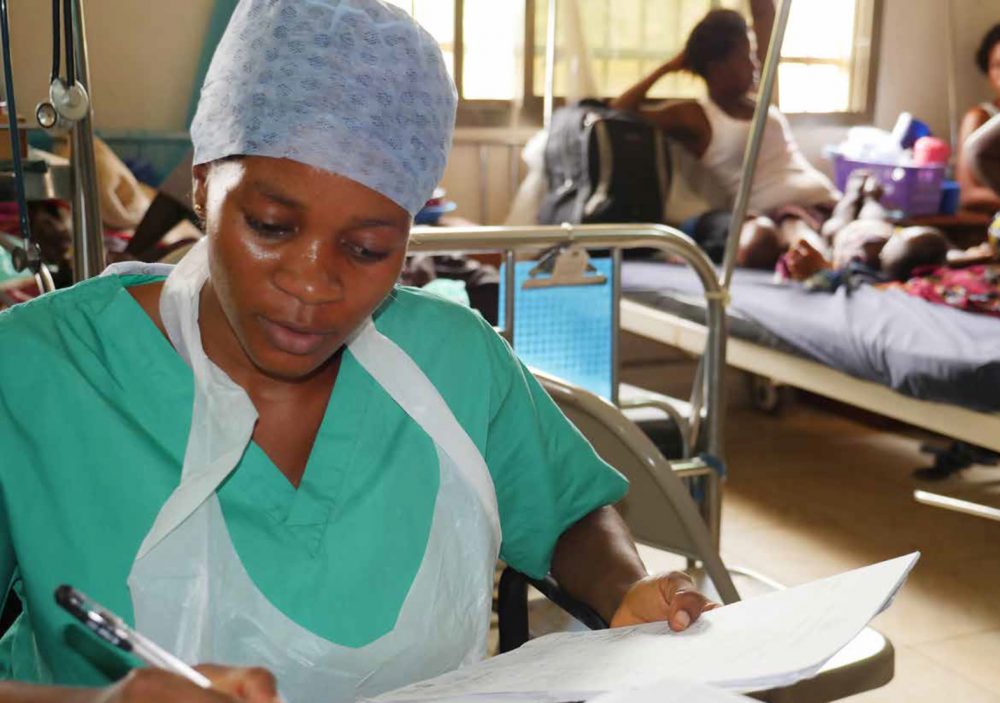Hypertension or High Blood Pressure
Hypertension is the main risk factor for developing cardiovascular disease. Each year 1.6 million deaths befall from cardiovascular disease in Africa.
Overview
The only way to find out if your blood pressure is high is to have your blood pressure checked.
Each year 1.6 million deaths befall from cardiovascular disease in Africa of which about half a million occur in people under age 70, which is considered premature and preventable death. Hypertension affects between 20-40% of the adult population of the region, meaning that in Africa around 250 million people suffer from high blood pressure. Hypertension is preventable or can be postponed by a group of preventive interventions, among which include the reduction of salt intake, a diet rich in fruits and vegetables, exercise and maintaining a healthy body weight. AHO promotes policies and projects to impact on public health the prevention of hypertension through policies to reduce salt intake, to promote healthy eating, physical activity and to prevent obesity. Promotes and supports projects that facilitate access to essential medicines for the treatment of hypertension and promotes the development of human resources in healt
What is high blood pressure?
Blood pressure is recorded with 2 numbers. The systolic pressure (higher number) is the force at which your heart pumps blood around your body.
The diastolic pressure (lower number) is the resistance to the blood flow in the blood vessels. They’re both measured in millimetres of mercury (mmHg).
As a general guide:
- high blood pressure is considered to be 140/90mmHg or higher
- ideal blood pressure is considered to be between 90/60mmHg and 120/80mmHg
- low blood pressure is considered to be 90/60mmHg or lower
A blood pressure reading between 120/80mmHg and 140/90mmHg could mean you’re at risk of developing high blood pressure if you don’t take steps to keep your blood pressure under control.
Risks of high blood pressure
If your blood pressure is too high, it puts extra strain on your blood vessels, heart and other organs, such as the brain, kidneys and eyes.
Persistent high blood pressure can increase your risk of a number of serious and potentially life-threatening conditions, such as:
- heart disease
- heart attacks
- strokes
- heart failure
- peripheral arterial disease
- aortic aneurysms
- kidney disease
- vascular dementia
If you have high blood pressure, reducing it even a small amount can help lower your risk of these conditions.
Causes of high blood pressure
It’s not always clear what causes high blood pressure, but certain things can increase your risk.
You’re at an increased risk of high blood pressure if you:
- are over the age of 65
- are overweight or obese
- are of African or Caribbean descent
- have a relative with high blood pressure
- eat too much salt and don’t eat enough fruit and vegetables
- don’t do enough exercise
- drink too much alcohol or coffee (or other caffeine-based drinks)
- smoke
- don’t get much sleep or have disturbed sleep
Making healthy lifestyle changes can help reduce your chances of getting high blood pressure and help lower your blood pressure if it’s already high.
Reduce your blood pressure
The following lifestyle changes can help prevent and lower high blood pressure:
- reduce the amount of salt you eat and have a generally healthy diet
- cut back on alcohol if you drink too much
- lose weight if you’re overweight
- exercise regularly
- cut down on caffeine
- stop smoking
- try to get at least 6 hours of sleep a night
Some people with high blood pressure may also need to take one or more medicines to stop their blood pressure getting too high.
Medicines for high blood pressure
If you’re diagnosed with high blood pressure, your doctor may recommend taking one or more medicines to keep it under control.
These usually need to be taken once a day.
Common blood pressure medications include:
- ACE inhibitors – such as enalapril, lisinopril, perindopril and ramipril
- angiotensin-2 receptor blockers (ARBs) – such as candesartan, irbesartan, losartan, valsartan and olmesartan
- calcium channel blockers – such as amlodipine, felodipine and nifedipine or diltiazem and verapamil.
- diuretics – such as indapamide and bendroflumethiazide
- beta-blockers – such as atenolol and bisoprolol
- alpha-blockers – such as doxazosin
- renin inhibitors – such as aliskiren
- other diuretics – such as amiloride and spironolactone
The medication recommended for you will depend on things like how high your blood pressure is and your age.


